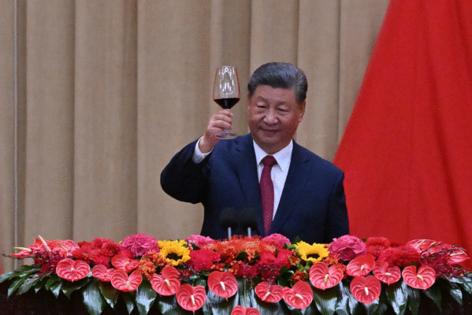Catherine Thorbecke: China hasn't destroyed the tech sector. It's sharpened it
Published in Op Eds
To most Western observers, it would appear that China has driven its technology industry off a cliff.
The number of startups fell by 50,000 between the peak in 2018 and 2023, with this year on track to be even lower. The market capitalizations of the biggest tech companies, including Alibaba Group Holding Ltd. and Tencent Holdings Ltd., have shrunk to the tune of hundreds of billions, and pale in comparison to U.S. peers. There is no sign that the sector will ever rebound to what it was before a government crackdown that kicked off in late 2020, even as policymakers have signaled it’s over. Becoming a billionaire entrepreneur has become something to be feared, rather than celebrated.
It’s easy for U.S. policymakers to see this with vindication and yet more evidence of a superior tech landscape at home. And from their vantage point, they are correct: President Xi Jinping strangled a generation of entrepreneurs who could have benefited consumers and made investors a lot of money.
But that doesn’t mean China’s innovation ecosystem is slowing. If anything, Xi has only sharpened its goal to focus on national clout and security in a way that could shift the global balance of power.
Beijing has given its tech industry something that Silicon Valley can only dream of: a mission. It may be easy for investors and free-market capitalists to scoff at the idea of innovation being driven by a purpose. But as the ongoing drama at OpenAI has laid bare — and as my colleague Parmy Olson has recently written — U.S. tech entrepreneurs and workers alike have long been obsessed with this concept. And a vast majority of Gen Z say having a sense of purpose is an important factor for work. OpenAI started as a nonprofit research organization with the goal of creating artificial intelligence that “benefits all of humanity,” and ended up launching ChatGPT, spurring the global AI boom. As it evolved to a “capped-profit” and now is poised to become a for-profit company, it has seen an exodus of much of its founding team.
Many Chinese, meanwhile, now believe the world is less secure than it was five years ago, and see tensions with Washington as one of the most pressing concerns. This existential threat of losing to the U.S. is being used as a driving force for China’s tech ambitions.
Fresh off dismantling the get-rich-quick era, Xi has doubled down on a push for tech-driven “high quality growth” as well as “common prosperity.” The government has laid out a vision for a technological future where China leads in strategic areas such as artificial intelligence, advanced manufacturing, and green industries like solar and electric vehicles. This is already reaping dividends as exports of batteries, electric cars and solar panels hit records.
The U.S. may currently have a lead in advanced technologies such as AI, but China is progressing rapidly with a laser-sharp focus to close that gap. New research suggests that the Communist Party’s top-down determination to dominate these global markets is driving innovation at a faster pace than thought, and many Chinese tech firms will likely equal or surpass Western companies within roughly a decade.
Washington seems acutely aware that Beijing’s tech prowess is posing a threat, and has reacted with a slew of export measures to prevent China from accessing cutting-edge AI chips and manufacturing equipment. But these policies have further spurred Beijing’s commitment to its tech self-sufficiency goals. A recent teardown of Huawei’s Xinchuang laptop shows that the country is making rapid progress on this front, with most of the important chips in the device coming from Chinese groups.
More recently, Beijing has been supporting this push by asking tech firms and electrical vehicle makers to buy more locally produced chips. This has provided a market for domestic semiconductor firms, and also opened sources of revenue that can be used for research and development as well as expansion.
The U.S. innovation ecosystem, driven by entrepreneurship, has spurred decades of rapid economic growth and consumer benefits. But after startups became the biggest companies in the world, the incentive to experiment and invent something truly new became obfuscated. It’s no longer innovate or die, but create shareholder value or perish. This has encouraged the brightest minds in Silicon Valley to focus on short-term returns rather than novel breakthroughs. It has turned once-exciting product launch events into boring updates.
China’s use of national interests as an incentive for innovation isn’t as far off from an all-too-American playbook that predated the U.S. tech revolution. Like the space race during the U.S.-Soviet Union Cold War that paved the way for Silicon Valley, many of these developments may end up having a dual use, providing downstream benefits to consumers.
It’s too soon for U.S. policymakers to look at the decimation of China’s internet and consumer tech sectors as signs of victory in this Cold War. Washington would be wise to foster purpose-driven research, whether at universities or independent labs, rather than leave America’s boldest ambitions to the whims of Big Tech interests.
____
This column does not necessarily reflect the opinion of the editorial board or Bloomberg LP and its owners.
Catherine Thorbecke is a Bloomberg Opinion columnist covering Asia tech. Previously she was a tech reporter at CNN and ABC News.
©2024 Bloomberg L.P. Visit bloomberg.com/opinion. Distributed by Tribune Content Agency, LLC.




























































Comments